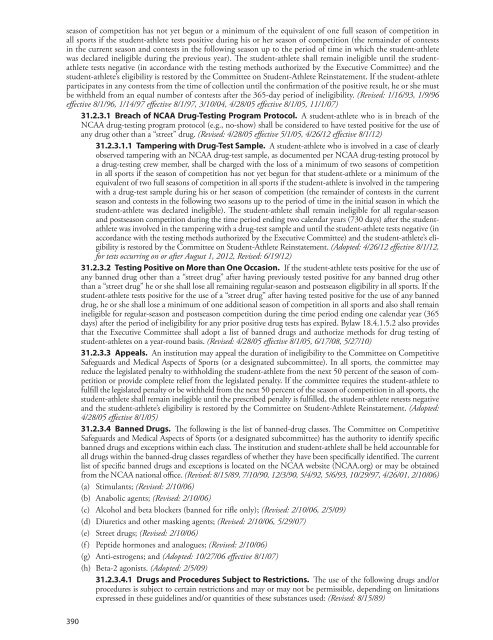ncaa-manual
ncaa-manual
ncaa-manual
- No tags were found...
You also want an ePaper? Increase the reach of your titles
YUMPU automatically turns print PDFs into web optimized ePapers that Google loves.
season of competition has not yet begun or a minimum of the equivalent of one full season of competition inall sports if the student-athlete tests positive during his or her season of competition (the remainder of contestsin the current season and contests in the following season up to the period of time in which the student-athletewas declared ineligible during the previous year). The student-athlete shall remain ineligible until the studentathletetests negative (in accordance with the testing methods authorized by the Executive Committee) and thestudent-athlete’s eligibility is restored by the Committee on Student-Athlete Reinstatement. If the student-athleteparticipates in any contests from the time of collection until the confirmation of the positive result, he or she mustbe withheld from an equal number of contests after the 365-day period of ineligibility. (Revised: 1/16/93, 1/9/96effective 8/1/96, 1/14/97 effective 8/1/97, 3/10/04, 4/28/05 effective 8/1/05, 11/1/07)31.2.3.1 Breach of NCAA Drug-Testing Program Protocol. A student-athlete who is in breach of theNCAA drug-testing program protocol (e.g., no-show) shall be considered to have tested positive for the use ofany drug other than a “street” drug. (Revised: 4/28/05 effective 5/1/05, 4/26/12 effective 8/1/12)31.2.3.1.1 Tampering with Drug-Test Sample. A student-athlete who is involved in a case of clearlyobserved tampering with an NCAA drug-test sample, as documented per NCAA drug-testing protocol bya drug-testing crew member, shall be charged with the loss of a minimum of two seasons of competitionin all sports if the season of competition has not yet begun for that student-athlete or a minimum of theequivalent of two full seasons of competition in all sports if the student-athlete is involved in the tamperingwith a drug-test sample during his or her season of competition (the remainder of contests in the currentseason and contests in the following two seasons up to the period of time in the initial season in which thestudent-athlete was declared ineligible). The student-athlete shall remain ineligible for all regular-seasonand postseason competition during the time period ending two calendar years (730 days) after the studentathletewas involved in the tampering with a drug-test sample and until the student-athlete tests negative (inaccordance with the testing methods authorized by the Executive Committee) and the student-athlete’s eligibilityis restored by the Committee on Student-Athlete Reinstatement. (Adopted: 4/26/12 effective 8/1/12,for tests occurring on or after August 1, 2012, Revised: 6/19/12)31.2.3.2 Testing Positive on More than One Occasion. If the student-athlete tests positive for the use ofany banned drug other than a “street drug” after having previously tested positive for any banned drug otherthan a “street drug” he or she shall lose all remaining regular-season and postseason eligibility in all sports. If thestudent-athlete tests positive for the use of a “street drug” after having tested positive for the use of any banneddrug, he or she shall lose a minimum of one additional season of competition in all sports and also shall remainineligible for regular-season and postseason competition during the time period ending one calendar year (365days) after the period of ineligibility for any prior positive drug tests has expired. Bylaw 18.4.1.5.2 also providesthat the Executive Committee shall adopt a list of banned drugs and authorize methods for drug testing ofstudent-athletes on a year-round basis. (Revised: 4/28/05 effective 8/1/05, 6/17/08, 5/27/10)31.2.3.3 Appeals. An institution may appeal the duration of ineligibility to the Committee on CompetitiveSafeguards and Medical Aspects of Sports (or a designated subcommittee). In all sports, the committee mayreduce the legislated penalty to withholding the student-athlete from the next 50 percent of the season of competitionor provide complete relief from the legislated penalty. If the committee requires the student-athlete tofulfill the legislated penalty or be withheld from the next 50 percent of the season of competition in all sports, thestudent-athlete shall remain ineligible until the prescribed penalty is fulfilled, the student-athlete retests negativeand the student-athlete’s eligibility is restored by the Committee on Student-Athlete Reinstatement. (Adopted:4/28/05 effective 8/1/05)31.2.3.4 Banned Drugs. The following is the list of banned-drug classes. The Committee on CompetitiveSafeguards and Medical Aspects of Sports (or a designated subcommittee) has the authority to identify specificbanned drugs and exceptions within each class. The institution and student-athlete shall be held accountable forall drugs within the banned-drug classes regardless of whether they have been specifically identified. The currentlist of specific banned drugs and exceptions is located on the NCAA website (NCAA.org) or may be obtainedfrom the NCAA national office. (Revised: 8/15/89, 7/10/90, 12/3/90, 5/4/92, 5/6/93, 10/29/97, 4/26/01, 2/10/06)(a) Stimulants; (Revised: 2/10/06)(b) Anabolic agents; (Revised: 2/10/06)(c) Alcohol and beta blockers (banned for rifle only); (Revised: 2/10/06, 2/5/09)(d) Diuretics and other masking agents; (Revised: 2/10/06, 5/29/07)(e) Street drugs; (Revised: 2/10/06)(f) Peptide hormones and analogues; (Revised: 2/10/06)(g) Anti-estrogens; and (Adopted: 10/27/06 effective 8/1/07)(h) Beta-2 agonists. (Adopted: 2/5/09)31.2.3.4.1 Drugs and Procedures Subject to Restrictions. The use of the following drugs and/orprocedures is subject to certain restrictions and may or may not be permissible, depending on limitationsexpressed in these guidelines and/or quantities of these substances used: (Revised: 8/15/89)390


